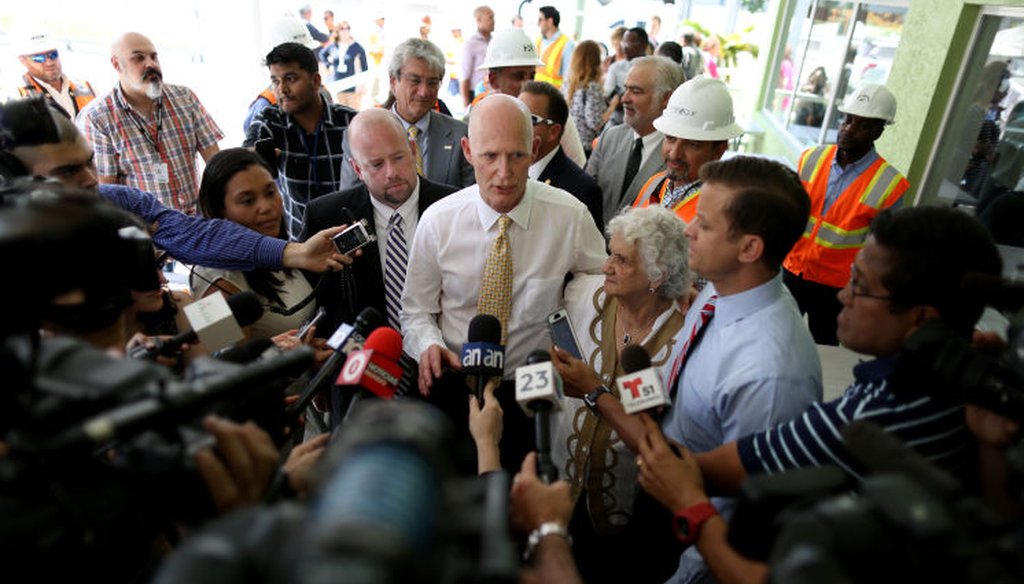Stand up for the facts!
Our only agenda is to publish the truth so you can be an informed participant in democracy.
We need your help.
I would like to contribute

Gov. Rick Scott denied reports that state banned the term "climate change"
Gov. Rick Scott’s record on the environment has faced renewed scrutiny after a news report stated that administrators in his Department of Environmental Protection were banned from using the terms "global warming" or "climate change."
Florida Center for Investigative Reporting, which broke the story, cited former DEP officials who said they had been told verbally to avoid such phrases.
"We were told not to use the terms ‘climate change,’ ‘global warming’ or ‘sustainability,’ " said Christopher Byrd, an attorney with the state’s Department of Environmental Protection from 2008 until 2013. "That message was communicated to me and my colleagues by our superiors in the Office of General Counsel."
After the report appeared, FCIR responded to critics who noted that the phrase "climate change" can be found on DEP’s website. FCIR explained that the majority of the documents predated Scott and that DEP’s servers host reports from other agencies and that the unofficial censorship system is porous.
The Washington Post then reported that a DEP official underlined the phrase "climate change" in a scientist’s paper multiple times, and she was told to remove it.
In the past, Scott has largely dodged questions about climate change using the refrain "I'm not a scientist." (Sen. Marco Rubio, R-Fla., has also used that phrase.)
Scott and his administration have denied that any such policy existed.
"It's not true," Scott told reporters in Hialeah March 9, without going into specifics.
Instead, Scott repeated familiar broad talking points about his environmental accomplishments without addressing whether any of them would address climate change.
"Let's look at what we've accomplished," he said. "We've had significant investments in beach renourishment, in flood mitigation. Look at what we've done with the Everglades: We settled a lawsuit over the Everglades. That litigation had been going on for decades. We put money in the Tamiami Trail, to raise that, to push water south. We've had - I think we've had record investments in our springs."
Here’s a look at some of our previous fact-checks of Scott’s claims about the environment and his progress on environmental-related promises.
Environmental spending
Scott claimed the state had spent millions on the environment during a CNN debate with Democratic challenger Charlie Crist on Oct. 21. "We have spent $350 million to deal with sea-level rise" in the Miami area, Scott said. and "hundreds of millions dollars to deal with coral reefs."
Scott was exaggerating. The state has spent $100 million to help the Keys upgrade to a sewer system, which should improve water quality -- a benefit for coral reefs. But Scott omitted that it was under Crist that the Legislature passed a law paving the way for the money. For the sea-level rise portion of his claim, his spokesman pointed to a variety of projects that related to flood mitigation or beach protection. While those are worthy projects, they don’t address future sea-level rise. We rated that claim Mostly False.
In March 2014, Scott said during his State of the State speech that "we have invested record funding in protecting our environment." That’s not correct. Scott’s spokesman said that he was referring to his "record" proposal to fund springs protection. But springs are only a subset of environmental projects. The budget for the state Department of Environmental Protection was not a record under Scott -- it was higher in more flush financial times under Bush and part of Crist’s term, and then plummeted along with the economy in the second half of Crist’s tenure and Scott’s tenure. We rated the claim False.
Next Gen ads
NextGen Climate launched several ads during the 2014 governor’s race that related to Duke Energy, the North Carolina-based electricity provider that merged with Progress Energy in 2012.
One ad said Scott is "letting Duke keep collecting billions" after the utility company took in advance fees from customers for two failed nuclear projects.
The claim left out the full context. The state’s Public Service Commission settled with the utility for $3.2 billion, not the governor or the Legislature. Scott and lawmakers have a say in who serves as commissioners, but the board’s decisions in utility matters is final. Scott could have used his influence to ask for changes or chosen different commissioners, but he’s been notably silent on the issue. Considering that conflicting evidence, we rated the statement Half True.
We also fact-checked NextGen ads about oil drilling near the Everglades.
One ad said Scott took $200,000 in campaign contributions from a company that "profited off pollution."
That’s partially accurate. Scott’s campaign received $50,000 from four different members of the Collier family. The Collier Resources Co. leased mineral rights on its land to another drilling company. However, the ad omitted the name of that other company -- Dan A. Hughes -- and preliminary tests showed no contamination. We rated that claim Half True.
Campaign promises
We have tracked several of Scott’s campaign promises related to the environment.
In 2014, Scott said he would secure more funding for springs restoration and alternative water supply programs. We gave him an In the Works after he proposed some funding in his budget. Scott wants to clean up the state's freshwater springs by increasing funding to $50 million, up from last year's $30 million. Scott's plan is to draw on some of the dedicated funds voters approved through November's Amendment 1 ballot initiative. Scott is also recommending $50 million for programs to develop alternative water supplies through sources besides pumping from Florida's aquifers.
In 2010, Scott promised to expand the use of nuclear fuels and alternative energy. Scott approved new nuclear plants at Turkey Point -- a project that is about a decade away. There has been some growth in the use of solar, but it still remains a very small portion of Florida's energy generation. We gave Scott a Compromise.
Scott also promised to explore oil drilling in a safe, environmentally sound way. We saw no significant steps by Scott on that and gave him a Promise Broken.
Our Sources
Florida Center for Investigative Reporting, "In Florida, officials ban term ‘climate change,’" March 8, 2015
Florida Center for Investigative Reporting, "Climate change ban? Then why are there references in state documents? We’ll explain," March 10, 2015
Washington Post, "Fla. scientist told to remove the phrase ‘climate change’ from report on climate change," March 9, 2015
Miami Herald, "Florida governor denies environmental agency banned term ‘climate change,’" March 9, 2015
See individual fact-checks for additional sources








































